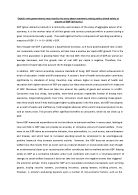Explain why governments may need to be wary about economic setting policy aimed solely at growth of GDP
Explain why governments may need to be wary about economic setting policy aimed solely at growth of GDP (10 marks)
GDP (gross domestic product) is a commonly used measure of the value of aggregate output of an economy; it is the market value of all final goods and services produced within a country during a given time period (usually a year). If we add together the four components of spending we obtain a measure of GDP: C + I + G + (X-M) = GDP.
Even though real GDP is growing in a hypothetical economy, so it has a positive growth rate, is does not necessarily mean that the economy will also have a positive per capita GDP growth. This is the case if the population is growing faster than the real GDP, then the amount of GDP per person on average decreases, and the growth rate of real GDP per capita is negative. Therefore, the government should take into account the % change in population.
In addition, GDP cannot accurately measure standards of living. GDP cannot reflect achievements in levels of education, health and life expectancy. A society’s level of health and education contribute significantly to standards of living. Countries may achieve higher or lower levels of health and education with a given amount of GDP per capita, but these may remain unaccounted for in measures of GDP. Moreover, GDP does not take into account the quality of goods and services. In a LEDC, Consumers may buy cheap, low-quality, short-lived products repeatedly instead of buying more expensive, longer-lasting goods. Over time, consumers could spend more replacing cheap goods than they would have if they had bought higher-quality goods in the first place, and GDP would grow as a result of waste and inefficiency. Technological advances often permit improved products to be sold at lower prices. This process offers significant benefits to consumers, which do not show up in GDP.








